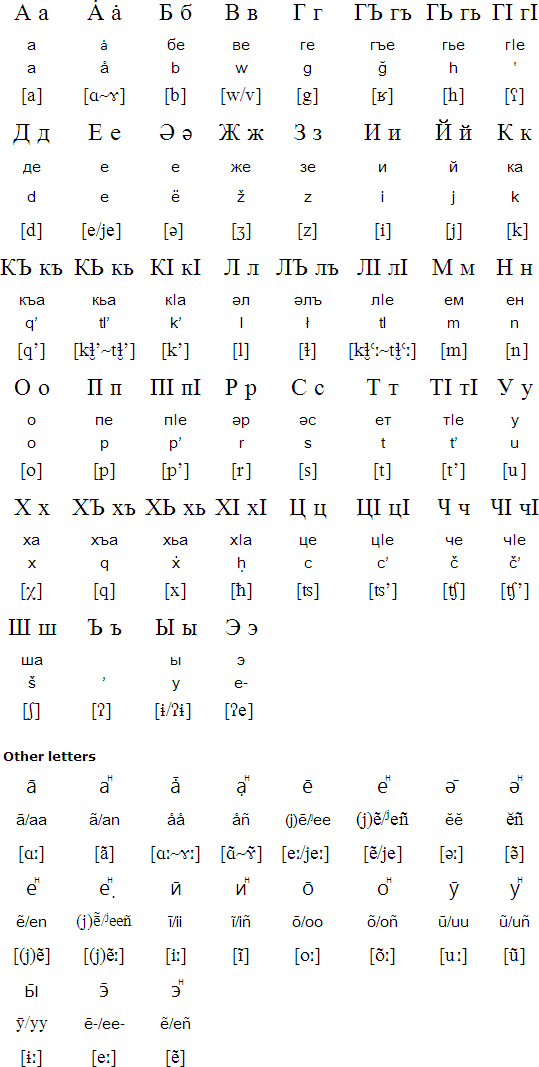Hunzib is a Northeast Caucasian language spoken in southwestern Dagestan in the Russian Federation by about 1,840 people, particularly in the Tsunta and Kizilyurt districts of Dagestan and in two villages across the border in Georgia.
Hunzib is closely related to Bezhta and Khwarshi, and less closely related to Tsez and Hinukh, and contains loanwords from Avar, Georgian, Turkish, Arabic and Russian.
Hunzib has no official status, is not taught in schools, and is rarely written. Hunzib speakers are educated in Avar for the first five years of their schooling, and in Russian thereafter.

Download alphabet chart for Hunzib in Word format
Information on pronunciation compiled by Wolfram Siegel
Кидбалло дии кlелlе нылlер,
КІекІе дэ гудни чlaлlер
Гудил дии хъохъла нилlер
Хъохъла дэ гьеммо мияр
Гьеммол дии оже нилlер
Оже дэ гьаса иер
Гьасол дии мухъе нилlер
Мухъе дэ мичолъlмире
Мичол дии ничlмат нылъlер
Ничlмат дэ нухъур хъулъlур
Эцlер, ыкълер
The girls gave me a fried grain
I threw the grain to the chicken
The chicken gave me an egg
I hit the egg on the pole
The pillar gave me a son
I sent my son to heaven
The sky gave me rain
I watered the field with rainwater
The field gave me food
I ate them, drank them, ate,
Grown up.
Source: Гунзибцы. XIX – начало XX века. by Ризаханова М.Ш. (2001)
Sample text provided by Jin Wei Hii
Information about Hunzib | Numbers in Hunzib
Information about the Hunzib language
http://en.wikipedia.org/wiki/Hunzib_language
https://www.ethnologue.com/language/huz
http://www.endangeredlanguages.com/lang/2316
Aghul, Akhvakh, Andi, Archi, Avar, Bagvalal, Batsbi, Bezhta, Botlikh, Budukh, Caucasian Albanian, Chamalal, Chechen, Dargwa, Godoberi, Hinukh, Hunzib, Ingush, Kaitag, Karata, Khinalug, Khwarshi, Kryts, Kubachi, Lak, Lezgian, Rutul, Tabassaran, Tindi, Tsakhur, Tsez, Udi
Abaza, Abkhaz, Adyghe, Aghul, Akhvakh, Akkala Sámi, Aleut, Altay, Alyutor, Andi, Archi, Assyrian / Neo-Assyrian, Avar, Azeri, Bagvalal, Balkar, Bashkir, Belarusian, Bezhta, Bosnian, Botlikh, Budukh, Bulgarian, Buryat, Chamalal, Chechen, Chelkan, Chukchi, Chulym, Chuvash, Crimean Tatar, Dargwa, Daur, Dolgan, Dungan, Enets, Erzya, Even, Evenki, Gagauz, Godoberi, Hinukh, Hunzib, Ingush, Interslavic, Itelmen, Juhuri, Kabardian, Kaitag, Kalderash Romani, Kalmyk, Karaim, Karakalpak, Karata, Karelian, Kazakh, Ket, Khakas, Khanty, Khinalug, Khorasani Turkic, Khwarshi, Kildin Sámi, Kili, Komi, Koryak, Krymchak, Kryts, Kubachi, Kumandy, Kumyk, Kurdish, Kyrgyz, Lak, Lezgi, Lingua Franca Nova, Lithuanian, Ludic, Macedonian, Mansi, Mari, Moksha, Moldovan, Mongolian, Montenegrin, Nanai, Negidal, Nenets, Nganasan, Nivkh, Nogai, Old Church Slavonic, Oroch, Orok, Ossetian, Pontic Greek, Romanian, Rushani, Russian, Rusyn, Rutul, Selkup, Serbian, Shor, Shughni, Siberian Tatar, Sirenik, Slovio, Soyot, Tabassaran, Tajik, Talysh, Tat, Tatar, Teleut, Ter Sámi, Tindi, Tofa, Tsakhur, Tsez, Turkmen, Tuvan, Ubykh, Udege, Udi, Udmurt, Ukrainian, Ulch, Urum, Uyghur, Uzbek, Veps, Votic, Wakhi, West Polesian, Xibe, Yaghnobi, Yakut, Yazghulami, Yukaghir (Northern / Tundra), Yukaghir (Southern / Kolyma), Yupik (Central Siberian)
Languages written with the Latin alphabet
Page last modified: 15.04.24
[top]
You can support this site by Buying Me A Coffee, and if you like what you see on this page, you can use the buttons below to share it with people you know.

If you like this site and find it useful, you can support it by making a donation via PayPal or Patreon, or by contributing in other ways. Omniglot is how I make my living.
Note: all links on this site to Amazon.com, Amazon.co.uk
and Amazon.fr
are affiliate links. This means I earn a commission if you click on any of them and buy something. So by clicking on these links you can help to support this site.
[top]